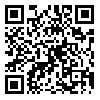BibTeX | RIS | EndNote | Medlars | ProCite | Reference Manager | RefWorks
Send citation to:
URL: http://hii.khu.ac.ir/article-1-2569-en.html
Background and Aim: Due to the extensive use of knowledge intelligence, the future of countries depend on the application of specialized knowledge-based social networks. Thus, it is noteworthy to highlight the important role of the professionals. The key indicators of a model for knowledge sharing of Iranian experts, in experts’ social networks has been identified.
Methods: For this purpose, experts were interviewed in depth using a semi-structured framework in the field of research (n = 15) as well as the Delphi method (n = 9) were used to collect data in research.
Results: Findings indicate that the main variable of knowledge sharing behaviors are divided into individual, group, and environmental indexes respectively. Components of the individual dimension of knowledge sharing includes motivation, ethicality, personality, ability, attitude towards knowledge sharing and psychological security. Group dimension of knowledge sharing include shared benefits, group structure and social capital; and finally environmental factors, including technological (beautiful graphics, user-friendly network, server security, the communication infrastructure), political-legal (Funding for R & D for cyberspace area, allocation of financial resources to develop the infrastructure, filtrating, laws relating to intellectual property, bandwidth regulations and laws of cyberspace), economic (The cost of Internet and diversity of online packages) socio-cultural (experts lifestyle and Iranian national character).
Conclusion. We can only come to a comprehensive and theoretical model in the field of knowledge sharing behavior of Iranian users when identify the definitions, concepts, dimensions and components of virtual space based on the conditions prevailing in the country.
| Rights and permissions | |
 | This work is licensed under a Creative Commons Attribution-NonCommercial 4.0 International License. |






